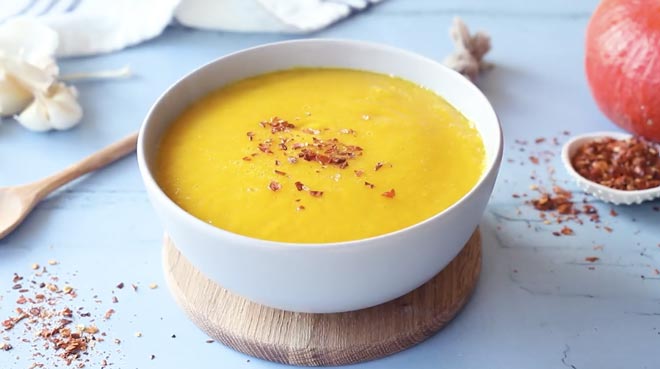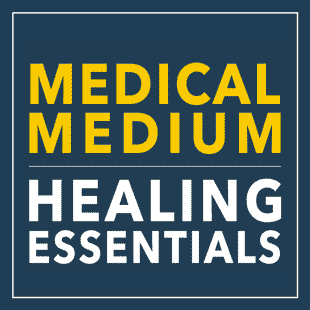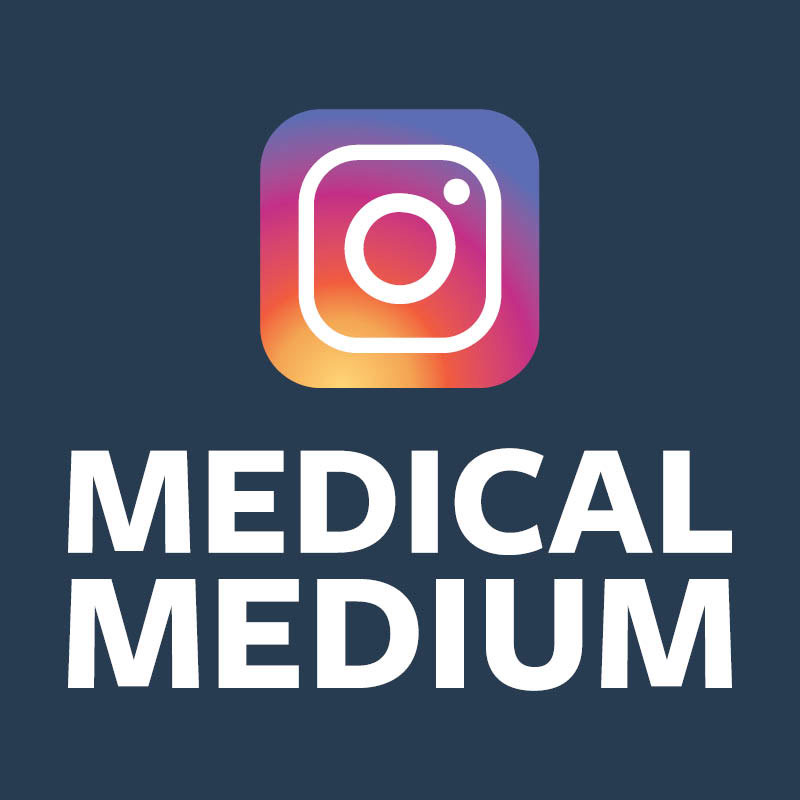Watch: Kabocha Squash Soup

Kabocha Squash Soup
This dairy-free, fat-free soup is like a hug inside a bowl. It’s creamy, warm, and comforting. The nourishing rich flavor of kabocha squash blends beautifully with the warmth of garlic, onions, and curry. This is a great one to make ahead and freeze so that you have an instant satisfying option on hand whenever you need it.
Winter squash (including kabocha, acorn, delicata, and butternut): Loaded with nutrients that our livers can easily store. High in carotenoids that protect liver cells from damage. The glucose in winter squash can stabilize the liver, allowing blood sugar to stabilize overall in the body.
Garlic: Since the liver deals with an onslaught of pathogens, it needs herbs and foods that help it fight its cause. Garlic is one such herbal food. The medicinal, pungent, astringent quality of garlic is a pathogen’s worst nightmare. Phytochemical compounds from garlic seep through the walls of the intestinal tract into blood vessels that lead up through the hepatic portal vein into the liver. The liver’s immune system welcomes these compounds because it knows they’re like a relief army coming in so the immune system can find reprieve and retreat to build up its forces. These phytochemical compounds are like throwing sand in someone’s eyes; they literally hit a variety of pathogens inside the liver, forcing them to back down and even killing off some of them. If you’re sensitive to garlic, try onions; they have similar qualities. If you’re not sensitive to garlic, don’t be afraid to bring it in when you feel like it.
Kabocha Squash Soup
Ingredients:
- 1 medium kabocha squash (see Tips)
- 3 cups vegetable broth (see Tips)
- 1 cup diced onion
- 4 garlic cloves, minced
- 1 teaspoon curry powder
- ½ teaspoon sea salt
- ½ lime, juiced
- ¼ teaspoon red pepper flakes (optional)
- ¼ teaspoon sea salt
- ½ cup water
Directions:
Bring a large pot of water to a rapid boil and submerge the whole kabocha squash, stem and all. Boil the squash for 10 minutes, flipping it upside down halfway through. Remove the squash carefully and set aside to cool.
When the squash is cool enough to handle comfortably, peel it, slice it in half, and remove the seeds. Cut the squash into cubes; this should yield about 4 cups. Place the cubed kabocha squash into a pot along with the vegetable broth, diced onion, garlic cloves, curry powder, sea salt, and lime juice. Bring the broth to a boil and then reduce to a rapid simmer, stirring frequently. Continue to simmer for 15 to 20 minutes, until the squash is tender and cooked through.
Transfer the entire contents to a blender and blend until smooth, slowly at first, allowing an opening for steam to escape through the top of the blender. Serve warm, topped with red pepper flakes if desired.
Tips:
*Make your own broth using the Liver Rescue Broth recipe on page 368 of Liver Rescue. Alternatively, you can find low-sodium vegetable broth at the grocery store (make sure it doesn’t have canola oil, citric acid, natural flavors, or other sneaky additives) or replace the broth with water in a pinch.
*If kabocha squash is unavailable where you live, try substituting butternut squash, acorn squash, or even sweet potato instead. You’ll need about 6 cups cubed squash of any variety.
Makes 2 to 4 servings
Find out more undiscovered properties of healing foods and how they support the liver, check out my bestselling book, Liver Rescue.
This item posted: 04-Jan-2019
The information provided on this Site is for general informational purposes only, to include blog postings and any linked material. The information is not intended to be a substitute for professional health or medical advice or treatment, nor should it be relied upon for the diagnosis, prevention, or treatment of any health consideration. Consult with a licensed health care practitioner before altering or discontinuing any medications, treatment or care, or starting any diet, exercise or supplementation program. Neither Anthony William nor Anthony William, Inc. (AWI) is a licensed medical doctor or other formally licensed health care practitioner or provider. The content of this blog and any linked material does not necessarily reflect the opinions of Anthony William, AWI or the principal author, and is not guaranteed to be correct, complete, or up to date.
Thanks for printing this post. For more, visit www.medicalmedium.com


